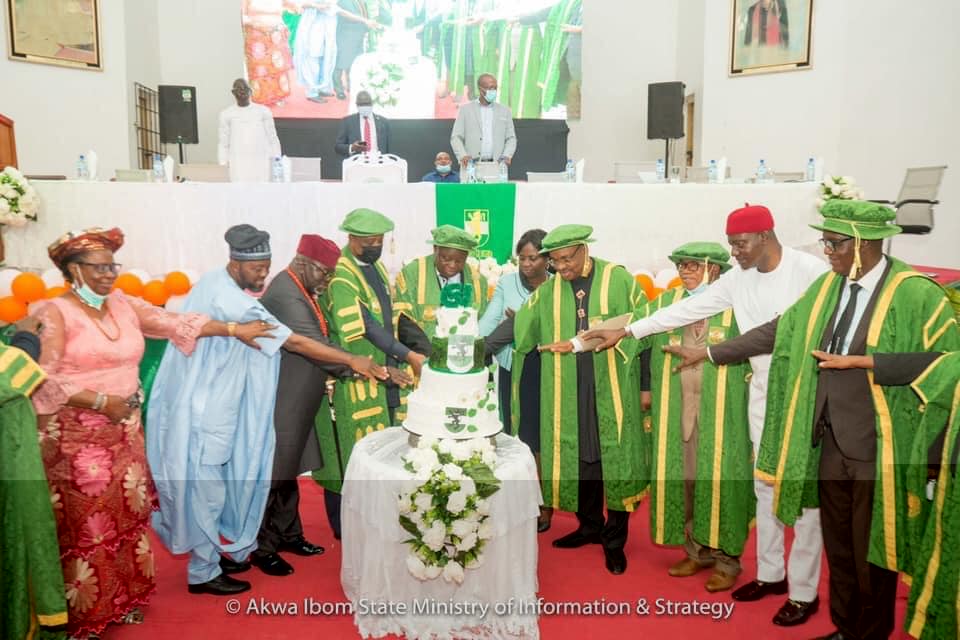Editorial
Prioritising Teachers’ Welfare

Tuesday, October 5, was observed as World Teachers’ Day, which was celebrated globally, including in Nigeria. Since 1994, with the assistance of the United Nations Educational, Scientific and Cultural Organisation (UNESCO), this day has been adopted annually to highlight teachers and their profession.
A year and six months into the Covid-19 crisis, the 2021 World Teachers’ Day concentrates on the support teachers need to positively commit to the recovery process under the theme: ”Teachers At The Heart Of Education Recovery”. A series of global and regional affairs would showcase the impact of the pandemic on the teaching profession, highlight effective and promising policy feedbacks, and plan to identify measures that need to be taken to ensure teachers realise their maximum potentiality.
Before the Coronavirus pandemic stalled the learning of Nigerian students, the country’s education system was experiencing its own epidemic: a highly deficient and unfair system with surprisingly limited education. At the climax of the pandemic, approximately 40 million students were affected by school closures across the country, but even before that, Nigeria had the highest proportion of out-of-school children worldwide.
As the second wave of the epidemic continues, school vacations have been extended in some states, indicating that children’s learning continues to hibernate. Therefore, attempts must be made to emphasise a direct and creative means to recover expected learning losses and transform Nigeria’s education system, well summarised by the acronym — FACTS: Foundation learning, Assessment, Curriculum alignment, Technology and Special needs.
On World Teachers’ Day, the services of teachers and their contributions to education are recognised and their role and relevance in the development of pupils and society acknowledged. This is a moment to pay tribute to teachers and deal with some problems confronting their occupation, so it tries to fascinate the brightest young minds to join the profession. Their significant role remains that of mentors and career coaches.
Regrettably, in Nigeria, this occasion only highlights the plight of teaching as a profession. Recently, the Teacher Registration Council of Nigeria (TRCN) revealed that only about 50 per cent of Nigerian teachers were qualified to teach. According to TRCN, the requisite qualification for any teacher is the National Certificate in Education (NCE) specified by the National Education Policy.
This is something TRCN must take seriously. The council has a responsibility to deny charlatans access to the teaching profession. It should ensure that only qualified persons who possess the basic training and qualifications may be employed in the profession. Unfortunately, many teachers view this work as a stop-gap and are in the industry to buy time while waiting for more profitable jobs.
In view of the increase in unemployment in the country, it is necessary to discourage education as a means of survival. This is especially true in private schools, where people who do not have the necessary qualifications are selected. Most private school owners do this primarily for low-cost labour.
There are structural issues within the education system that hinder development efforts. Challenges, particularly in Nigeria, include low wages, poor capacity building, insufficient resources and the inability to regulate education to meet the psycho-social demands of children. Yet, teachers continue to do their best to elevate the next generation of nation builders.
President Muhammadu Buhari approved an increase in the pay structure of teachers during World Teachers’ Day 2020 which is still underway. Other incentives include allowances, housing, training, extending years of service from 35 to 40, and the retirement age from 60 to 65. This is exemplary, but it must be enforced accordingly. All we need is for the governors and others to implement the initiative within their states. The National Assembly should ensure that the process is carried out smoothly by means of adequate legislation.
However, commemorating this year’s Teachers’ Day, the Federal Government announced that it had approved N75,000 per semester allowance for students pursuing degree courses at public universities and N50,000 allowance for Nigerian Certificate of Education (NCE) students. This deliberate attempt to capture the best minds in the education industry is both meritorious and depressing. While the movement may add content to the profession, its durability is questionable, particularly given the economic deterioration.
Here in Rivers State, teachers in observance of the day, splashed accolades and encomiums on Governor Nyesom Wike. They commended him for securing their well-being by paying regular salaries. He was equally applauded for his renovation of primary and secondary schools to guarantee better teaching and learning environment for teachers, and his policy of inclusiveness in the state’s education sector. While urging him to consider more promotion of teachers and address other matters, they eulogised the governor for his policies which are set to revolutionise education and teaching in the state.
This year’s Teachers’ Day reflects the view that without qualified, committed and competent teachers, we cannot achieve substantial or high-quality education. Nigerian leaders may be weak and slow in governance, but they are indeed masters and maestros in functions, anniversaries and commemorations. As in past years, our leaders reached out last Tuesday and delivered brilliant speeches and promises to teachers.
Rhetoric is not enough. A systematic strategy is needed, featuring increased education budgets and key tasks to thwart the system from foundering. In the next decade, while the rest of the world may be reveling in the benefits of computer-aided learning, Nigeria’s education, under the prevailing funding system, may be hit by the perpetual surge in the youth population, likely to become worse.
If our leaders immediately begin to prioritise teacher training and well-being, which is the centre of any useful education system, this dreadful situation does not need to evolve completely. Nothing should deter us from learning from China and the Scandinavian countries, who today are considered to be the best places in the world to provide incentives for teachers.
Editorial
For A Prosperous 2026

Editorial
Task Before New Defence Minister
Editorial
HYPREP And The Collapsed Water Tank


